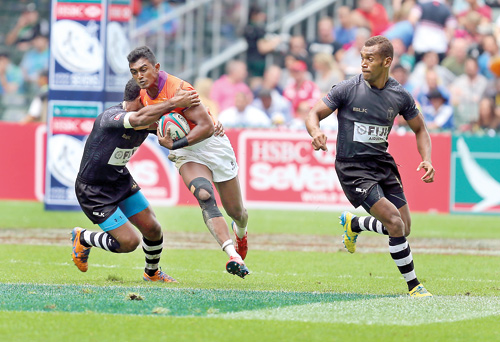Seneviratne impressed with SL Rugby’s progress
View(s): Asanga Seneviratne, the President of SLRFU was happy on the progress of the Sri Lanka at Asian Series Sevens. He commented that “the programmes have worked and that the plan is on trail. The Asian Sevens opening leg showed that Sri Lanka will show a strong presence in the next two legs of the Series”. Losing to Hong Kong in the Final by 17 points to 22, Sri Lanka finished second in the opening leg. Sri Lanka have to maintain the winning consistency to remain in contention for places one and two. The third being in Colombo, Sri Lanka will have the home advantage. Seneviratne opined that “a huge risk was taken with a commitment of over Rs 10 million without a sponsor”.
Asanga Seneviratne, the President of SLRFU was happy on the progress of the Sri Lanka at Asian Series Sevens. He commented that “the programmes have worked and that the plan is on trail. The Asian Sevens opening leg showed that Sri Lanka will show a strong presence in the next two legs of the Series”. Losing to Hong Kong in the Final by 17 points to 22, Sri Lanka finished second in the opening leg. Sri Lanka have to maintain the winning consistency to remain in contention for places one and two. The third being in Colombo, Sri Lanka will have the home advantage. Seneviratne opined that “a huge risk was taken with a commitment of over Rs 10 million without a sponsor”.
He was happy of the plans he has put in place during the last four years with more weight given to Sevens. He lamented that for the future of the game there was to better communication and understanding with the schools section for the future of the game. In Sri Lanka the need is to have a solid inclusion of the schools and they cannot be on their own as they need to gel with the national plan. This may also mean playing more Sevens games at age groups. The Under-16 and Under-18 should be a target and involving them needs to stop dragging the game. In this area we understand that next year the junior age games will be played along with the first 15s games. This may not be to the liking of schools coaches and advisory boards who depend on the Under-18 to fill the bench.
 If you need keep them with the first team and have more at Under-18. But don’t play them in the Under-18 and keep them on the bench as there will be less recovery time and prospective players may get injured. The SLRFU President was also of the view that the future development Rugby needs a good sponsor. In this area there is a need to work on a joint plan to market the game to attract a better package. This approach has not been possible as there is little cohesion in working and or in direction between the Schools Rugby and National Rugby. The Sunday Times asked the President about the number of injuries that players sustain and thus making them unavailable. He said that the Union is working with a New Zealand fitness trainer to improve this aspect of the game.
If you need keep them with the first team and have more at Under-18. But don’t play them in the Under-18 and keep them on the bench as there will be less recovery time and prospective players may get injured. The SLRFU President was also of the view that the future development Rugby needs a good sponsor. In this area there is a need to work on a joint plan to market the game to attract a better package. This approach has not been possible as there is little cohesion in working and or in direction between the Schools Rugby and National Rugby. The Sunday Times asked the President about the number of injuries that players sustain and thus making them unavailable. He said that the Union is working with a New Zealand fitness trainer to improve this aspect of the game.
Critically, he mentioned that Danushka Ranjan may have been lost to Rugby as he played with an injury while at school and had not been attended to properly. He also mentioned of the case of Avishka Sheik, who continued to play with a rib injury and would have been lost if not handled by a versed professional. There is a lot more for Rugby and that depends on how well the partners understand the national need and the format that we should be concentrated upon. He said that there is a plan to play in two provincial tournaments and New Zealand legendary Seven’s coach Sir Gordon Tietjens will be helping Sri Lanka. The problem however will be to get the clubs to release players. He said that he will not ask much and will concentrate on a development squad keeping the future in mind.
However that team will also need at least two or three of young players with experience. The problem however will be whether the clubs will release. With Rugby recognised at the Olympics Sri Lanka Rugby should look at winning a medal at the next Asian Games and to a place in the World Rugby Sevens. The ST understands that some players who were in the Seven’s squad in the first leg have already taken wing to play 15s Rugby and there will be less recovery time before the second leg. I spoke to Imthi Marikkar, the High Performance Director of SLRFU, who was quite impressed with the performance of the Under-20 and Under-18 teams and was full of praise for coaches Sudath Sampath and Mohamed Mushtaq. He expressed the need to start specialising on Sevens players as well as Sevens coaches with a future of development in mind.
He was concerned of the lack of concentration on player welfare especially in the junior age groups. With so much money spent in schools Rugby there is a tendency to focus on winning than the game and future of the athlete. People tend to play a schoolboy who may not be 100% fit due to a niggling injury. The idea being to win and the welfare of the player is neglected and the boy as well as the game suffers. He was of the view that more sevens should be played and thus have a large pool to select from when the National team wants players. The Sunday Times looked back to the Mercantile Sevens and was a little surprised when JKH with over 30 athletes in its fold did not field two teams nor did MAS with around 10 top athletes play in the championship league.
The reason as I understood is that there are injuries and the chance to win was remote. This leads in the direction of playing to win forgetting the need to participate. Because if you participated more top players would have been out there and given a wider range to choose for the Super Sevens as well as the National team. JKH did play in the Bowl which limited the number of A Division players. Is the culture of play to win and participation not important a top down influence to the schools or a bottom up pressure from the school to the higher level?
Vimal Perera is a former Rugby Referee, coach and Accredited Referees Evaluator IRB


